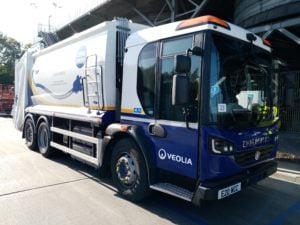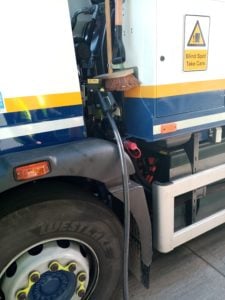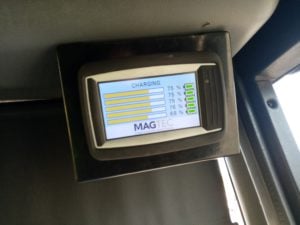Launched at the start of September, Westminster City Council’s first two 26-tonne electric Refuse Collection Vehicles (eRCV) continue to amass positive feedback and performance data. Powered by the electricity produced from the waste they collect, the eRCVs were originally diesel waste collection trucks reaching their end-of-life and were due to soon be replaced. Since there is currently no other reliable existing electric collection fleet technology, at Westminster City Council we knew something had to be done. We needed to create a viable, reliable, robust and sustainable solution to reach the goal of making Westminster a carbon-neutral city by 2040.
Testing the eRCVs in different conditions

Electric refuse collection truck
In partnership with Veolia, Magtec and Sheffield City Council, and with funding from Innovate UK, we began this project together less than two years ago with the idea of upcycling old diesel trucks and repowering them with new electric engines to reduce harmful emissions.
At present, there are four models of its kind undergoing testing. While two are being assessed in the busy, urban area of Westminster, the remaining two are in Sheffield, enduring steep hills and greater distances between collection points.
The goal is to test these collection trucks in extreme conditions, especially with winter fast-approaching, to ensure they can be used across the UK. While they may still be in their assessment stage, the vehicles are currently receiving software upgrades. They are expected to be back in service at the end of November.
A fully electric fleet as a sustainable solution
When considering the seven-year lifespan of a waste collection vehicle, we discovered that an electric fleet would be more sustainable and cost-effective in the long-term compared to diesel. Moreover, the cost of repowering a vehicle would be recovered during its lifetime. In comparison to a standard Euro 6 diesel waste collection truck, early life cycle cost analysis suggests a saving of roughly £2,000 per month per eRCV.

eRCV charging point
If we were to look at the air quality damage costs of nitrogen oxides (NOx), on average it costs £6,199 per tonne of emission. When you consider the fact that converting one waste collection vehicle to fully electric is the equivalent of taking 30 diesel-powered cars off the street, it makes a big difference in air quality. This is especially important as high levels of air pollution have been linked to conditions such as asthma, heart and lung disease, frail bones, dementia and bladder cancer. Other waste collectors seen operating in Westminster are still using this old diesel technology.
Thankfully, as Westminster City Council continues to work on developing its electric fleet, we expect to see a significant drop in emission levels. The initial reports of our eRCVs suggest great reliability and performance, and fleet operatives have given their seal of approval. The testing phase of the project is expected to wrap up by April 2020 with the objective of turning Westminster City Council’s entire 200-vehicle collection fleet fully electric by December 2021. This will be subject to technology maturity as we continue to monitor the industry for new technological advancements during the transition.
How your business can help
At Westminster City Council Commercial Waste Services, we take pride in our low-cost, easy-to-use, reliable, and environmentally friendly services. Many Westminster businesses have discovered the superior environmental benefits of using the City Council’s business waste collection service.
Collections from private commercial waste providers place an unnecessary burden on the environment since they duplicate journeys that already exist as part of the City Council’s collection system. This further increases traffic congestion, pollution levels, affects Londoners’ health and fails to add any genuine value for the local community. Increased vehicle movements also have a negative impact on traffic safety.
These private collectors may also use small and inefficient vehicles, resulting in an excessive number of round trips to collect waste, as well as outdated diesel-fuelled vehicles which produce high exhaust emission levels.
By having Westminster City Council collect your business’ commercial waste, you can reduce these duplicated journeys by up to 80%. To see how we work with businesses on tackling inefficient commercial waste collection movements, read our case study.
Stay up-to-date
As there is currently no OEM-approved electric vehicles, other companies are testing prototypes but have not gone into manufacturing and production. By taking the first steps in testing electric Refuse Collection Vehicles on the streets of Westminster, Westminster City Council is at the forefront of innovation and sustainable solutions to help the environment, leading in our industry.
We will continue to keep you updated on the evolution of Westminster City Council’s eRCVs. In the new year, we will be collecting more data showing their impact on the environment and Westminster communities and businesses. Make sure you stay up-to-date by reading our ‘News’ section.
If you wish to know more about traffic congestion and air quality in Westminster, be sure to download our congestion and air quality leaflet.





